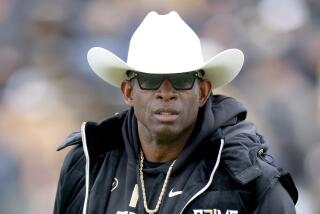Commentary : TCU’s Wacker Guilty Only of Seeing No Evil?
On the surface, Wackergate could be great for college football. Here, America, is one coach so committed to cleaning up his dirty business that he turned in his own program.
By golly, Texas Christian University’s Jim Wacker suspended six players, including Heisman Trophy hopeful Kenneth Davis, when they confessed to playing for pay. Wouldn’t most coaches have told the players, “So? Just don’t tell a reporter or NCAA investigator”? Wouldn’t many already have known about the payments?
Not Wacker, who claimed no knowledge of the deals, which were made during the F.A. Dry regime. Not Wacker, who two years ago sent his Wacker Letter to other Southwest Conference coaches warning he would turn in anybody.
Unbeleeevable , as Wacker would say.
Yet what I find unbelievable is that Wacker is as naive as he wants us to believe. You may want to cling to your image of Wacker as the lone sheep in wolf’s clothing. Yet your lone hope must be held responsible for the TCU Six.
James Herbert Wacker is guilty of seeing no evil. Of hearing just what he wanted to hear. Of setting himself up as the Coach in the White Hat before cleaning out his closets.
How could Wacker publicly have condemned schools such as SMU, which is serving an NCAA sentence, without getting to the sleazy bottom of Horned Frogs football? In one night, the TCU Six gave the NCAA a case as strong as it built in two years against SMU. Really, the Mustangs were hanged by one major violation--an alum moving a recruit’s family from Pittsburgh to Dallas. There were four other serious violations, but No. 1 mainly brought SMU’s record penalties--45 lost scholarships, two years of no bowls, one of no TV. Honestly, should TCU get off any easier? Six players have admitted getting paid through their TCU careers, including the last two seasons under Wacker. Has the NCAA ever had better evidence?
It’s difficult to believe Wacker didn’t at least suspect that where there had been smoke (big bucks alum Dick Lowe) there was fire (hotly recruited Kenneth Davis and Egypt Allen). How much longer can coaches plead no knowledge? F.A. Dry, now a Baylor assistant, says he also had no knowledge of the deals.
Bull-loney, as Wacker would say. When you’re a head coach in probably the country’s most cut-throat conference, you know what’s going on. You know which of your alums has a sugar-daddy reputation, and you know what very well may have happened when that alum and a prize recruit wound up in the same room. Wacker is not the Pee Wee Herman of college football. Pee Wees don’t go 8-3 in the SWC.
Wacker feels the same pressure as do the seven other SWC coaches in Texas. As Wacker told me two years ago, before his first TCU-SMU clash, a victory would “give our alumni the bragging rights that are very important to them.”
I’ve yet to hear a rival recruiter accuse Wacker of cheating since he has been at TCU. But somehow, after 1-10, 2-7-2 and 3-8 seasons, Dry didn’t exactly leave the cupboard bare. Last season, Wacker’s second, he went 8-3 with his high-voltage veer and personality--and a Dry-recruited nucleus.
Didn’t Wacker wonder why they chose TCU? Or did he not want to know until after they’d helped launch his program?
The bidding for Davis and Allen has become Texas legend. Any recruiter worth his expense account will grin and tell you about how Temple’s Davis signed with mighty Nebraska, then suddenly opted for lowly TCU after a visit from a certain alum. That same sugar daddy was involved in the 1982 SMU-TCU clash over Allen and Gearld Taylor, who said they were a package deal. Legend has it they were hidden the night before the signing date.
Wacker never heard these tales? It wasn’t as if he came to TCU from Northern Alaska. He had just spent four seasons at Southwest Texas State.
And he was first flown to TCU in the jet of Dick Lowe, who has remained close to Wacker’s program.










